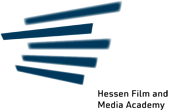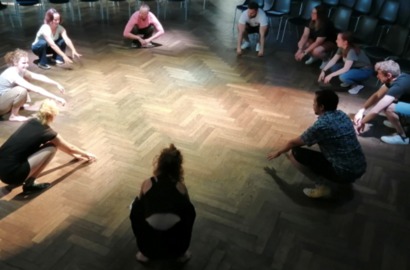Responsive Body | Responsive Technology Workshop – How does technology, programming, music and dance work together?
From 30.06.-02.07. the workshop with the Estonian/Norwegian duo, Külla Roosna and Kenneth Flak, was dedicated to this question.
The workshop dealt with the integration of sound and movement, using the open-source programming language SuperCollider and movement sensors to generate sound.
Dance artists, musicians, programmers and any interested students of the hFMA-network were welcome to participate in the workshop on the use of accelerometers as a way to create and control the soundscore of a performance.
The workshop was mainly focused on the connection between movement and sound. The participants learned how to build a fully functional setup for sensor interaction, using their smartphones and laptops. The programs used were mostly open-source and free of charge. The participants needed no previous dance experience.
It all ended in the final event on Saturday, 02.07. in the Kulturzentrum (KUZ) Kreuz, Schlitzerstraße 81, 36039 Fulda.
Doors opened at 7:30 p.m., started at 8 p.m. - the entry was free!
The workshop was held in English. More info here. A report on the workshop is available under downloads.
What does responsive body mean?
Responsive Body is a dynamic system created by Roosna & Flak based on listening to yourself and the environment, training sensitivity and coordination as well as strength and stamina. Its purpose is to develop a strong, resilient, and intelligent body that is open to internal and external impulses. Roosna & Flak use movement sensors to extend the impact of their bodies into sound, light, visuals, and architecture, feeding this back into the experience of moving.
More about the duo Külli Roosna & Kenneth Flak:
Internationally active choreographers and dancers Külli Roosna (Estonia) and Kenneth Flak (Norway) have been collaborating since 2008. Whether they are creating their own choreographies or collaborating with others, their work deals with the narratives and technologies of the body. They have explored a wide range of themes, including deep ecology, Viking mythology, totalitarianism, and internet culture. The core of their work is human experience in interconnected realities. This is often explored through the dancing body’s possibilities and limitations, in a constant dialogue with the digital technologies and discourses that extend and counterpoint it.
Their interactive music and dance performance Blood Music – 2014 was nominated for the Estonian Dance Awards. Stalking Paradise – 2014, commission work for Lublin Dance Theater was selected for the biannual Polish Dance Days. Prime Mover – 2018 and Two Body Orchestra – 2020 were nominated for the Estonian Dance Awards.





